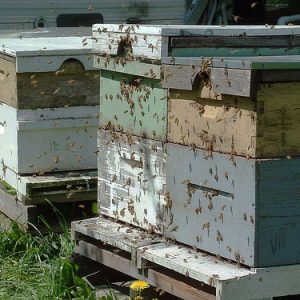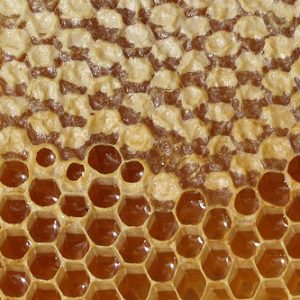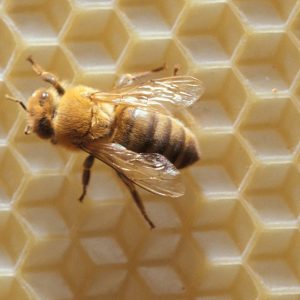calsfoundation@cals.org
Beekeeping
By 2010, more than 1,500 Arkansas beekeepers had registered with the Arkansas State Plant Board, the vast majority of whom were hobbyists. Hobbyist beekeepers maintain fewer than five hives and do not rely upon beekeeping as their primary source of income. An estimated twenty-five to thirty commercial beekeepers operate in the state. The two types of beekeepers collectively manage more than 50,000 colonies, making Arkansas a significant national producer of honey.
Commercial apiaries in Arkansas vary in size. Some commercial apiaries include Coy’s Honey Farm in Brookland (Craighead County), which is one of the largest; Clyde Gray in Jonesboro (Craighead County), who has hives from Jonesboro to Wynne (Cross County); Culp’s Honey Farm in Jonesboro; Richard’s Apiaries in Benton (Saline County); Crooked Creek Apiaries in Marvell (Phillips County); and Curtis Apiaries in Lake City (Craighead County). Fisher’s in North Little Rock (Pulaski County) is the largest processor of honey in the state.
Honey has distinctive flavors depending on the source of the pollen. Many products come from the bees’ hard work, not just honey. Some of these include bee pollen used for allergies; beeswax for candles and other products; the foundation for new hives; ingredients for many foods; and components used in cosmetics, lip balm, and pharmaceuticals.
Aside from honey production, bees are directly or indirectly essential to the production of one-third of the foods humans eat. More than eighty percent of commercial crops are pollinated by honeybees, including not only fruits and vegetables but also nuts, herbs, and spices. Some of these crops, such as almonds and seedless watermelons, would not grow at all without pollination from honeybees. Many Arkansas beekeepers, both commercial and hobbyists, rent out their honeybees and truck them to California, Maine, and Wisconsin to help with pollination of vital crops grown in those states. Within Arkansas, the bees are hired out to pollinate local crops such as soybeans and cotton as well as fruits and vegetables. Out-of-state beekeepers bring their bees to pollinate Arkansas crops as well.
A number of regional beekeepers’ associations exist across the state, as well as the larger Arkansas Beekeepers Association, which holds a statewide meeting each year and presents information to assist beekeepers in the state. The Division of Agriculture of the University of Arkansas (UA) in Fayetteville (Washington County) offers courses in beekeeping, while the University of Arkansas Cooperative Extension Service makes available information on beekeeping in Arkansas, including the state’s apiary laws, and offers numerous educational events.
Apis mellifera, or the Western honeybee, is the state insect of Arkansas. Among the other kinds of bees encountered in Arkansas is the solitary bee, which does not sting and does not live in large colonies. Solitary bees are important for the pollination of wildflowers, orchards, and gardens. Bumblebees are also present, as are Africanized honeybees (so-called killer bees). The latter is a hybrid of several European and south African honeybee subspecies and looks much like the Western honeybee; it is also a pollinator. These bees will set up colonies in the same areas and sometimes mingle with the Western honeybee hives. The main difference between the two is that the Africanized honeybee is more aggressive in defending its hive and responding to a perceived threat. In Arkansas, the Africanized honeybee has been found in ten counties, with roughly half of the counties considered at risk for Africanized honeybees.
Colony Collapse Disorder describes the sudden losses of fifty to ninety percent of colonies, which began happening in 2006. This disorder may not be a recent problem, as similar situations have periodically happened in the past, though there is still much debate as to the source of the disorder. What is known is that the number of managed bee colonies has been declining since the 1940s due to troubles with parasites, the expenses of keeping honeybees and maintaining their health, and low honey prices forcing beekeepers to quit the industry. Arkansas has been one of the states affected by this disorder, and the problem continues to be monitored.
For additional information:
Arkansas Beekeepers Association http://arbeekeepers.org/ (accessed February 14, 2022).
“Beekeeping—Apiculture in Arkansas.” University of Arkansas Cooperative Extension Service. https://www.uaex.uada.edu/farm-ranch/special-programs/beekeeping/ (accessed February 14, 2022).
LaRue, Cristina. “Enthusiasts Going Ape for Apiaries.” Arkansas Democrat-Gazette, March 9, 2024, pp. 1D, 2D. Online at https://www.arkansasonline.com/news/2024/mar/08/arkansans-swarm-to-learn-beekeeping/ (accessed March 11, 2024).
Wallace, Allison. A Keeper of Bees: Notes on Hive and Home. New York: Random House, 2006.
Laura Downing
Arkansas State University
 Agriculture
Agriculture Bee Hives
Bee Hives  Honey Comb
Honey Comb  Honeybee, Official State Insect
Honeybee, Official State Insect 




Comments
No comments on this entry yet.